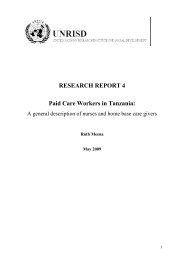Women's Employment - United Nations Research Institute for Social ...
Women's Employment - United Nations Research Institute for Social ...
Women's Employment - United Nations Research Institute for Social ...
Create successful ePaper yourself
Turn your PDF publications into a flip-book with our unique Google optimized e-Paper software.
Women’s employment in the textile manufacturing sectors of Bangladesh and Morocco<br />
Third, their low wages put women workers in a precarious<br />
position. Although the work is important <strong>for</strong> them, it does not<br />
completely solve their material needs. The uncertainties of their<br />
employment reduces their motivation and this affects their diligence<br />
and punctuality.<br />
9. Forms of solidarity and strategies of resistance<br />
The factory is a system that brings together management (the<br />
head of the firm and his supervisory staff) and the women workers.<br />
They all have different interests, sometimes divergent ones, and they<br />
all use strategies to defend their interests. In industry, workers usually<br />
engage in collective action through trade unions to put <strong>for</strong>ward their<br />
claims. However, there was little evidence of trade union activity in<br />
the factories studied. Only one (male) worker in the sample claimed<br />
union affiliation. While some workers (95) in the sample claimed that<br />
their non-membership was a personal choice, there was a significant<br />
number who responded that they had never been approached by a<br />
union (45) or that they had no knowledge about unions (45). Only a<br />
handful of respondents (five) said that they did not join a union <strong>for</strong><br />
fear of sanctions. Nonetheless, workers’ membership in and attitudes<br />
towards unions are clearly shaped by those of management, <strong>for</strong> which<br />
trade unions are an anathema.<br />
Unions are an obstacle to our work. We prefer to have direct<br />
negotiations with the workers. I have some workers whom I recruited<br />
<strong>for</strong> lack of anyone better when we started up. I cannot dismiss them<br />
now even if they have learnt nothing and are not productive. I have<br />
inherited a labour <strong>for</strong>ce that is not qualified but I keep them on all<br />
the same. (Head of a carpet factory)<br />
As a consequence, it may be that even if workers are members<br />
of a union they will not declare it. However, there was some evidence<br />
to suggest that women workers are distrustful of unions and their<br />
representatives. Various reasons were given by the women workers<br />
<strong>for</strong> their non-membership in unions. One common view is that unions<br />
are a prerogative of men. This view was echoed by the heads of the<br />
factories. Men are seen to have greater ambitions and more likely to<br />
resort to joint action to press their claims than women, who do not<br />
express their grievances <strong>for</strong>mally and are more likely to attempt to<br />
use personal relations to settle their problems. In addition, the high<br />
turnover rate suggests that women workers will simply move to<br />
another factory or quit their jobs, rather than to try to overcome poor<br />
working conditions. The impact of traditional <strong>for</strong>ms of solidarity<br />
94
















